Related Research Articles

Ghantasala Venkateswararao, known mononymously by his surname as Ghantasala, was an Indian playback singer and film composer known for his works predominantly in Telugu and Kannada cinema and also in Tamil, Malayalam, Tulu and Hindi language films. He is considered one of the greatest singers of Telugu cinema. In 1970, he received the Padma Shri award, India's fourth highest civilian award for his contribution to Indian cinema. According to The Hindu and The Indian Express, Ghantasala was 'such a divine talent and with his songs he could move the hearts of the people'. 'Ghantasala's blending of classical improvisations to the art of light music combined with his virtuosity and sensitivity puts him a class apart, above all others in the field of playback singing'. Gifted with what Indian film historian V. A. K. Ranga Rao called 'the most majestic voice', Ghantasala helped Telugu film music develop its own distinct character which remains unparalleled. He is referred to as the 'Gaana Gandharva' for his mesmerising voice and musical skills.

Anarkali is a 1955 Indian Telugu-language historical romance film, written and directed by Vedantam Raghavayya. The film stars Akkineni Nageswara Rao and Anjali Devi. It is based on the legend of the romance between Mughal prince Salim and the eponymous court dancer.

Anjali Devi was an Indian actress, model and producer in Telugu and Tamil films. She was well known for her role as the Devi Sita in Lava Kusa as well as for the title roles in movies like Chenchu Lakshmi, Suvarna Sundari and Anarkali.

Vedantam Raghavayya was an Indian film director, dance choreographer, and actor known for his work in Telugu and Tamil cinema. An accomplished Kuchipudi dancer, he was honoured with the title "Bharata Kala Prapurna" by the Andhra Pradesh government in recognition of his expertise.
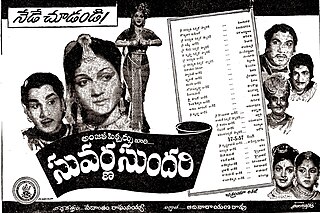
Suvarna Sundari is a 1957 Indian Telugu-language swashbuckler film directed by Vedantam Raghavayya. It stars Anjali Devi and Akkineni Nageswara Rao with music composed by P. Adinarayana Rao. The film was produced by Adinarayana Rao under the Anjali Pictures banner. Gemini Ganesan played the male lead in the simultaneously shot Tamil version.

Chilakalapudi Seeta Rama Anjaneyulu, popularly known as C. S. R., was an Indian method actor, and thespian best known for his works in Telugu cinema, and Telugu theater. He acted in many stage dramas and portrayed lead characters and mythological roles in over 175 movies. He was one of the lead actors of his time. Anjaneyulu was an established lead actor by the late 1930s, preceding the entrance of actors such as NTR and ANR. His performance in the super-hit Bhaktha Ramadasu in 1937 won him many accolades. In the 1950s, starting with Pathala Bhairavi screened at the first International Film Festival of India, he began acting in character roles. In Pathala Bhairavi, he plays a king worried about his daughter, a princess kidnapped by a wicked magician played by Ranga Rao.

Mahakavi Kshetrayya is a 1976 Telugu-language biographical film, based on the life of Kshetrayya, produced by P. Adinarayana Rao under the Anjali Pictures banner and directed by Adurthi Subba Rao & C. S. Rao. It stars Akkineni Nageswara Rao in the title role, with Anjali Devi, Manjula as female leads, and music also composed by P. Adinarayana Rao. Actually the film direction was started by veteran Adurthi Subba Rao but he had expired in the middle of the movie and director C. S. Rao completed the movie.

Bhakta Tukaram is a 1973 Indian Telugu-language biographical film based on the life of the saint-poet Tukaram, produced by P. Adinarayana Rao under the Anjali Pictures banner and directed by V. Madhusudhana Rao. It stars Akkineni Nageswara Rao, Anjali Devi and Sivaji Ganesan, with music also composed by Adinarayana Rao.
B. A. Subba Rao was an Indian film director, producer, and screenwriter who primarily worked in Telugu cinema. He played a pivotal role in shaping the careers of several prominent actors, including N. T. Rama Rao. Subba Rao made his directorial debut with Palletoori Pilla (1950), a film that launched N. T. Rama Rao in his first lead role and became a major success. He went on to direct other notable films such as Raju Peda (1954), Chenchu Lakshmi (1958), and Bhishma (1962).

Kadaru Nagabhushanam or K. B. Nagabhushanam was an Indian film director and producer in the 1940s to 1960s, working in Telugu and Tamil cinema. He was the husband of P. Kannamba. They established Rajarajeshwari Films and produced many mythological films starring Kannamba in the lead role including Harischandra. Their social film Navajeevanam on untouchability got the recognition of Madras State and was chosen as the best feature film.
Penupatruni Adinarayana Rao was an Indian music director, film producer, lyricist and play writer. He co-founded "Aswini Pictures" with Akkineni Nageswara Rao and produced some movies in Telugu and Tamil. Later, he produced several blockbuster Telugu films under his own production house, Anjali Pictures, named after his actress wife, Anjali Devi. He also composed and produced music for several Tamil and Hindi films.

Phoolon Ki Sej is a 1964 Indian Hindi-language social film written and directed by Inder Raj Anand. It stars Ashok Kumar, Manoj Kumar, Vyjayanthimala in lead roles, along with Nirupa Roy, Lalita Pawar, Mehmood, Shubha Khote, Mukri, Kanhaiyalal in supporting roles. Music by Adi Narayana Rao is featured, including the song "Aa Bhi Ja Rasiya". The movie was based on Gulshan Nanda's novel of the same name. The film was produced by Anjali Pictures, the production company owned by actress Anjali Devi and husband P. Adinarayana Rao. Phoolon Ki Sej is about a love between Nirmal Verma and Karuna.
Paradesi may refer to:
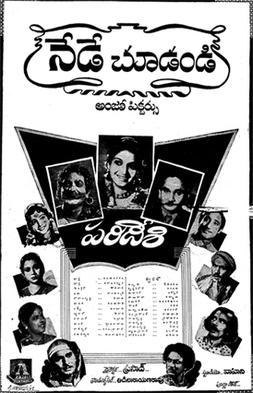
Paradesi or Poongothai is a 1953 Indian Telugu-Tamil bilingual romance film, produced by P. Adinarayana Rao under the Anjali pictures banner and directed by L. V. Prasad. It stars Akkineni Nageswara Rao, Anjali Devi, Sivaji Ganesan and music also composed by P. Adinarayana Rao. The film is a remake of the Hindi movie Raj Rani (1950). Paradesi was an average grosser at the box office. No print of Poongothai is known to survive, making it a lost film.
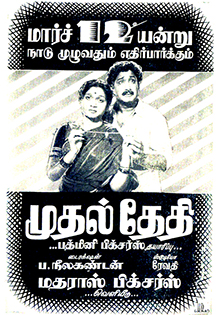
Mudhal Thethi in Tamil, Modala Thedi in Kannada is an Indian bilingual film, directed by P. Neelakantan and produced by B. R. Panthulu. This was the first film produced by Panthulu under Padmini Pictures banner. The Tamil version starred Sivaji Ganesan, Anjali Devi, N. S. Krishnan and T. A. Madhuram in lead roles. The film had musical score by T. G. Lingappa scoring for his first feature film. The film was a remake of the Hindi film Paheli Tarikh (1954).

Sati Sumathi is a 1967 Telugu-language Hindu mythological film, produced by Chinna Rao under the Chinni Brothers banner, presented by Anjali Devi and directed by Vedantam Raghavayya. It stars Kantha Rao, Anjali Devi and music composed by P. Adinarayana Rao.

Runanubandham is a 1960 Indian Telugu-language drama film, produced by P. Adinarayana Rao under the Anjali Pictures banner and directed by Vedantam Raghavayya. It stars Akkineni Nageswara Rao, Anjali Devi, and music composed by P. Adinarayana Rao. This film had its beginning sequence in Gevacolor.
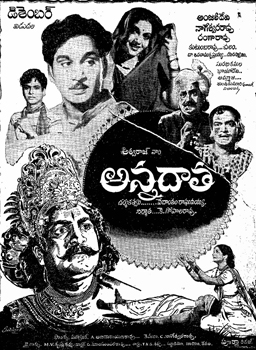
Annadata (transl. Farmer) is a 1954 Telugu-language drama film, produced by K. Gopala Rao under the Ashwaraj Films banner and directed by Vedantam Raghavayya. It stars Akkineni Nageswara Rao and Anjali Devi, with music composed by P. Adinarayana Rao.

Mangaiyar Ullam Mangatha Selvam is a 1962 Indian Tamil-language film directed by Vedantam Raghavayya. The film stars Gemini Ganesan and Anjali Devi. It was released on 31 August 1962.
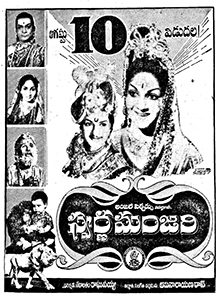
Swarna Manjari is a 1962 Indian Telugu-language swashbuckler film, produced by P. Adinarayana Rao under Anjali Pictures, and directed by Vedantam Raghavayya. It stars N. T. Rama Rao an Anjali Devi, with music composed by P. Adinarayana Rao. The film was simultaneously made in Tamil as Mangaiyar Ullam Mangatha Selvam.
References
- 1 2 3 4 ఆచారం షణ్ముఖాచారి. "ఆణిముత్యాలు: అక్కినేని, అంజలీల రజతోత్సవ సినిమా 'సువర్ణసుందరి'". Sitara (in Telugu). Eenadu . Retrieved 15 September 2024.
- 1 2 3 "Profile of Anjali Devi". Idlebrain.com . 4 January 2008. Retrieved 17 September 2024.
- 1 2 3 4 5 6 7 8 సీవీఆర్ మాణిక్యేశ్వరి (14 March 2020). "ఫ్లాష్ బ్యాక్ @ 50 - అమ్మకోసం". Andhra Bhoomi (in Telugu). Retrieved 17 September 2024.
- ↑ Tiruvayapati, Rajagopal (24 August 2014). "The much revered Anjali Devi". The Hans India . Retrieved 16 September 2024.
- ↑ "Anjali Devi Jayanti: పిల్లల తల్లైనా స్టార్ హీరోయిన్గా ఖ్యాతిగాంచిన అలనాటి మేటి నటి అంజలీదేవి జయంతి నేడు". TV9 Telugu . 24 August 2021. Retrieved 16 September 2024.
- 1 2 "Paradesi (1953)". The Hindu. 16 November 2013. ISSN 0971-751X . Retrieved 17 September 2024.
- 1 2 3 4 "Anarkali (1955)". The Hindu. 28 August 2014. Retrieved 30 October 2019.
- ↑ Tanmayi, Bhawana (17 June 2017). "Anarkali: The musical love story". Telangana Today . Archived from the original on 28 December 2018. Retrieved 28 December 2018.
- 1 2 "తెలుగు వారి 'సీత' అంజలీదేవి". Sakshi (in Telugu). 13 January 2014. Retrieved 17 September 2024.
- 1 2 "Adieu to Anjali". The Hindu. 18 January 2014. ISSN 0971-751X . Retrieved 15 September 2024.
- ↑ Sastry, K. N. T. (1993). L.V. Prasad: a monograph. Wiley Eastern. ISBN 9788122405040.
- ↑ Thoraval, Yves (2000). The cinemas of India. Macmillan India. ISBN 978-0-333-93410-4.
- ↑ Anjali Pictures' Golden Hit Suvarna Sundari Archived 27 January 2013 at the Wayback Machine
- ↑ "Anjali Pictures' Golden Hit Suvarna Sundari". Archived from the original on 27 January 2013. Retrieved 27 April 2009.
- ↑ Suvarna Sundari (1957) completes 50 years Archived 14 February 2012 at the Wayback Machine
- ↑ "Adutha Veettu Penn". The Indian Express . 24 April 1959. p. 10.
- ↑ "Mangayar Ullam Mangatha Selvam". The Indian Express . 31 August 1962. p. 3.
- ↑ "Swarna Manjari (Preview)". Know Your Films.
- ↑ "Swarna Manjari (Review)". The Cine Bay.
- ↑ "Phoolon Ki Sej". Ibosnetwork.com. Retrieved 8 March 2012.
- ↑ "Amma Kosam (1970)". Indiancine.ma. Retrieved 30 October 2019.